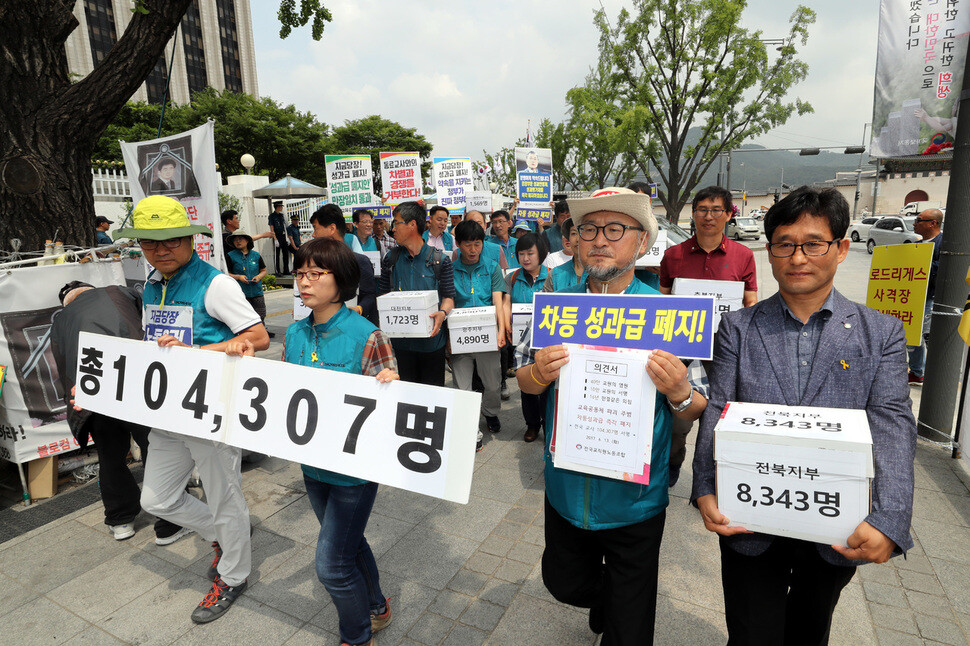hankyoreh
Links to other country sites 다른 나라 사이트 링크
Finance Ministry abolishing plans for performance-based pay system

Guidelines for introducing a performance-based pay system, which was one of the Park Geun-hye administration’s (2013-16) reform projects for public institutions, are being abolished.
The Ministry of Strategy and Finance announced that it will hold a meeting of its public institution steering committee on June 16 to scrap the recommendation for performance-based pay at public institutions. The next question is the fate of incentives amounting to as much as 160 billion won (US$142 million) that are to be returned by institutions that have abandoned performance-based pay, with public institution unions calling for their use as funding to convert irregular workers to regular status.
“Based on the issues that have continuously been raised about the methods of public institution operation introduced during the last administration, our plan is abolish the guidelines for introducing a performance-based salary system,” a senior Ministry of Strategy and Finance official told the Hankyoreh in a June 13 telephone interview, adding that the ministry “plans to hold a public institution steering committee meeting on June 16 to vote on the details.”
Performance-based pay, which has been introduced at 119 public institutions, has been the source of frictions due to its having been implemented without labor-management agreement at 48 of them.
With different institutions showing different results from the introduction of performance-based pay, the ministry plans to develop plans for eliminating it at specific institutions rather than abolishing it across the board. Ideas include holding labor-management discussions to revise employment regulations at institutions where the system was introduced by labor-management agreement, while allowing the board of directors to restore the previous wage system at institutions where the system was imposed by board vote. The administration also plans to recover 160 billion won (US$142 million) in incentives paid to institutions that have decided to do away with the system, and the remove penalties - such as total personnel cost freezes - imposed on institutions that did not introduce it.
Institutions that abolish performance-based pay appear likely to restore their original wage system first before considering adoption of a duty-based pay system depending on future guidelines for revising the public sector wage system. A duty-based pay system is one in which the level of pay is determined by the difficulty and nature of duties. At the time of the May 9 presidential election, then-nominee Moon Jae-in declared that he was opposed to the Park Geun-hye administration’s model for performance-based pay, but added that it was not right to have a structure where wages simply increase with seniority and important to introduce a new duty-based pay system going ahead.
The Park administration’s recommendation for performance-based pay at public institutions dates back to Jan. 2016. Its idea involved extending the performance-based salary system applied at the executive level to employees at public institutions nationwide. The administration went on to push the system’s introduction by developing a plan that May for giving incentives to “outstanding performers” introducing performance-based pay and penalties to institutions that did not implement it, including freezes on total personnel costs and demerits in management assessments. The move resulted in frictions as a number of public institutions introduced the system without labor-management agreement, prompting strikes and litigation by labor unions. The Labor Standards Act stipulates that a majority of workers must consent to changes to employment regulations that are prejudicial to employees.
By Noh Hyun-woong and Park Tae-woo, staff reporters
Please direct questions or comments to [english@hani.co.kr]

Editorial・opinion
![[Column] Season 2 of special prosecutor probe may be coming to Korea soon [Column] Season 2 of special prosecutor probe may be coming to Korea soon](https://flexible.img.hani.co.kr/flexible/normal/500/300/imgdb/original/2024/0426/3317141030699447.jpg) [Column] Season 2 of special prosecutor probe may be coming to Korea soon
[Column] Season 2 of special prosecutor probe may be coming to Korea soon![[Column] Park Geun-hye déjà vu in Yoon Suk-yeol [Column] Park Geun-hye déjà vu in Yoon Suk-yeol](https://flexible.img.hani.co.kr/flexible/normal/500/300/imgdb/original/2024/0424/651713945113788.jpg) [Column] Park Geun-hye déjà vu in Yoon Suk-yeol
[Column] Park Geun-hye déjà vu in Yoon Suk-yeol- [Editorial] New weight of N. Korea’s nuclear threats makes dialogue all the more urgent
- [Guest essay] The real reason Korea’s new right wants to dub Rhee a founding father
- [Column] ‘Choson’: Is it time we start referring to N. Korea in its own terms?
- [Editorial] Japan’s rewriting of history with Korea has gone too far
- [Column] The president’s questionable capacity for dialogue
- [Column] Are chaebol firms just pizza pies for families to divvy up as they please?
- [Column] Has Korea, too, crossed the Rubicon on China?
- [Correspondent’s column] In Japan’s alliance with US, echoes of its past alliances with UK
Most viewed articles
- 1[Column] Season 2 of special prosecutor probe may be coming to Korea soon
- 2‘We must say no’: Seoul defense chief on Korean, USFK involvement in hypothetical Taiwan crisis
- 3Is N. Korea threatening to test nukes in response to possible new US-led sanctions body?
- 4Amnesty notes ‘erosion’ of freedom of expression in Korea in annual human rights report
- 5Division commander ordered troops to enter raging flood waters before Marine died, survivor says
- 6N. Korean delegation’s trip to Iran shows how Pyongyang is leveraging ties with Moscow
- 7[Editorial] Korea’s surprise Q1 growth requires objective assessment, not blind fanfare
- 8Is Japan about to snatch control of Line messenger from Korea’s Naver?
- 9No good, very bad game for Korea puts it out of Olympics for first time since 1988
- 10[Reportage] On US campuses, student risk arrest as they call for divestment from Israel